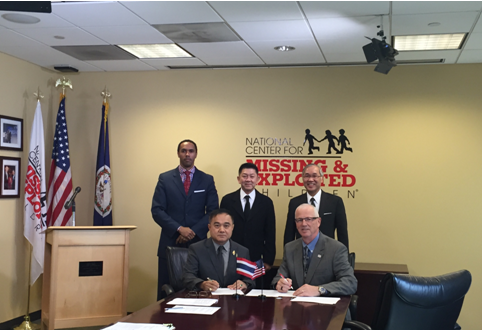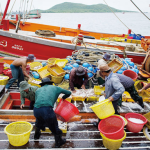
Thailand and the United States today took a significant step forward in their partnership to combat child sexual exploitation with the signing of an important information-sharing agreement.
On 27 March 2017, representatives of Thailand Internet Crimes Against Children Task Force (TICAC), Royal Thai Police, and the U.S. National Center for Missing and Exploited Children (NCMEC), signed an agreement which will allow the Thai side to gain direct access NCMEC’s reports on cases of child sexual exploitation.
Police General Tamasak Wicharaya, Deputy Director of the Center for Children, Women, Family Protection and Anti-Trafficking in Persons, Head of TICAC, and Mr. John Clark, NCMEC President and CEO signed the CyberTipline Remote Access Policy at NCMEC’s office in Alexandria, Virginia.
The signing ceremony was attended by representatives from the U.S. State Department, Federal Bureau of Investigation (FBI) and Homeland Security Investigations (HSI). Ambassador of Thailand to the U.S. Pisan Manawapat; Police Lieutenant General Jaruvat Vaisaya, Commissioner of Legal Affairs and Litigation, Royal Thai Police; Mr. David Prince, Acting Deputy Assistant Director, HSI International Operations; and Ms. Thanida Menasavet, Counselor, Royal Thai Embassy also joined as witnesses.
 Given the transnational nature of child sexual exploitation problem, both sides expressed strong commitment to work closely together as partners to protect children from abuses and exploitation. Ambassador Pisan stressed that Thailand and the U.S. are mutually reliable partners and commended the FBI, HSI and NCMEC for working hand in hand with their Thai counterparts to bring child sex offenders to justice.
Given the transnational nature of child sexual exploitation problem, both sides expressed strong commitment to work closely together as partners to protect children from abuses and exploitation. Ambassador Pisan stressed that Thailand and the U.S. are mutually reliable partners and commended the FBI, HSI and NCMEC for working hand in hand with their Thai counterparts to bring child sex offenders to justice.
Based on a U.S. model, the Thai Government has set up TICAC since December 2015, headed by Police General Tamasak Wicharaya. The Royal Thai Police has been working directly with FBI and HSI to access the database of NCMEC. The FBI, HSI and the Royal Thai Police collaborate closely to share real-time information on reported cases of sexual exploitation facilitated online, which in many cases, leads to human trafficking investigations.
***********************
Washington,D.C.
March 27, 2017





